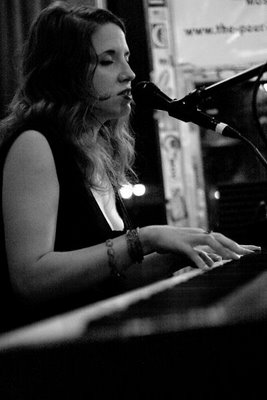
Finally picked up the latest issue of Opera America's rag and betwixt its covers are the usual snaps of Grand Opera productions featuring Giulio Cesare's Divine Julius (as in Gaius Ceasar) in a vaguely fascistic 20th century uniform or Wagner's Das Liebesverbot in a 50s disco setting. The cover displays a Tales of Hoffman which seems to include robots of a breed I believe unknown in Offenbach's time as well as a white-lab-coat-frocked doctor with steampunk gizmos on his head. I was drawn back to a jet-lagged endurance-fest in some sunken Dutch city trying to make heads or tails of a Peter Sellars "contemporary staging" of a Rake's Progress which seemed to have been rethunk as a anti-prison-industry diatribe. And there is my friend of a friend Roy Rallo too (although I do have to say I loved the bit in his Finta Giardiniera where, in one of those comedies of misidentification so belovéd of our artistic forebears, the lady who has just mistakenly given a blow job to the wrong fellow in some sort of 70s high-school auditorium or something rises as the lights come on, fades away and draws the back of her hand across her check in a lovely post-head gesture.)
Yes, I know, I know, in our remix culture® we all love the vegematic mish-mosh and hotch-potch of low and high and black and white where blending usurps creating and simple-minded novelty wrests the crown of achievement from laborious toil. And I accept all that. I myself have manipulated, slowed down, processed and otherwise pissed on pieces of high art and then called them my own. But why, beseechest me of thou, is it OK to totally ignore the stage directions of the opera libretto, the settings and characters and motions and decor that provide some context for the piece, but it is somehow not OK to touch the music or the words? Why don't these postpostmodern reimaginings apply themselves to the notes and rhythms and other composerist bits as well? Well, we know why: stage directions are second-class citizens, not at the level of the real art.
We see the same abominations in the non-music-theater world as well. The fact that the following anonymously authored entry is considered a point even deserving of empathy is somewhat shocking to me:
Since Beckett's death, all rights for performance of his plays are handled by the Beckett estate, currently managed by Edward Beckett, the author's nephew. The estate has a controversial reputation for maintaining firm control over how Beckett's plays are performed and does not grant licences to productions that do not strictly adhere to the writer's stage directions. (from Wikipedia)
Would there be such gumption if the evil estate made vain protestations against those productions that ignored all the other words appearing on the page? I mean, sure, do what thou wilt shall be the whole of the law, so go ahead: blend, chop and liquefy it all, but why, after one is done changing all the author's words that just happen not to be actually spoken, do you, yes you, the one with bloody hands churning the grinder handle demand that the poor and probably dead author's name be kept on the marquee?
When the director of my own opera Mordake worked with the libretto - a beautiful object written by the young, gifted & macabre Douglas Kearney - the sung words were changed hardly a bit and only after careful consultation with the writer, whereas the stage directions were ignored from the get-go, and my mild remonstrations in favor of at least considering their value were met with an awkward silence, some quiet coughs, knowing glances in the direction of the cast member and then quietly ignored.
So, the libretto for St Cecilia, the new twinkle in my eye, is being written only as stage directions, no dialog at all, no escape from the handcuffs for the poor director assigned to the task. I'm doing this out of a certain cantankerousness of course, but goddamn it my rage must be assuaged; and I pray that the wails of anguish that rise from the theater soothe the now-avenged souls of the dramatists so cruelly wronged.





